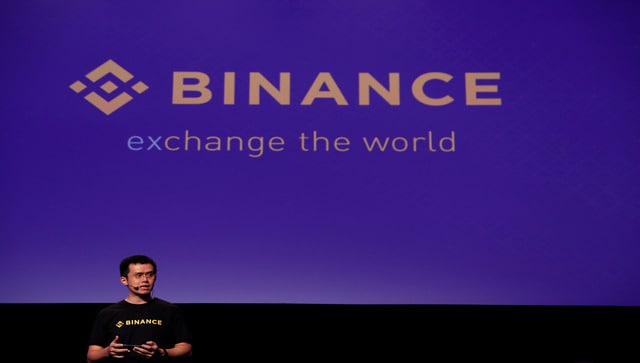Binance, the world’s largest cryptocurrency exchange, is in trouble. The United States government has accused the company of aiding militant groups such as Hamas, sanctions violations, and facilitating human and narcotics trafficking.
The company’s CEO, Changpeng Zhao, on Tuesday (21 November), pleaded guilty to violating US anti-money laundering laws and sanctions violations. He also agreed to pay more than $4.3 billion to settle the charges, reported NBC News.
How is Binance tied to Hamas and sanctioned actors? What next for the crypto exchange? Let’s take a closer look.

Binance CEO Changpeng Zhao resigns, pleads guilty to money laundering case for $4.3 billion.
Charges against Binance
Binance, which makes up for about half of all crypto activity, admitted to failing to comply with the Bank Secrecy Act, US anti-money laundering law, and not implementing reporting programs for suspicious transactions, according to the Associated Press (AP).
The US Treasury Department said it has taken “unprecedented action” against the global trading platform for violating anti-money laundering laws.
Treasury Secretary Janet Yellen said Binance was guilty of “consistent and egregious violations of US anti-money laundering and sanctions laws.”
“Binance turned a blind eye to its legal obligations in pursuing profit. Its willful failures allowed money to flow to terrorists, cybercriminals, and child abusers through its platform,” Politico quoted Yellen as saying.

According to the Treasury Department’s statement, Binance “willfully failed to report” over 100,000 suspicious transactions from several sanctioned groups, such as Hamas’ military arm, Al-Qassam Brigades; Al Qaeda, the Islamic State of Iraq and Syria, Palestinian Islamic Jihad, various criminal ransomware hackers and users operating in US-sanctioned nations like North Korea and Iran, reported NBC News.
As per Politico, a senior Treasury official said most of the sanctions programs involved Iran.
In February 2019, Samuel Lim, Binance Holdings’ then-chief compliance officer, acknowledged the crypto exchange was being used to channel funds to Hamas, telling a colleague that terrorists usually sent “small sums,” as per a Bloomberg report.
The colleague responded by text that Hamas could “barely buy an AK47 with 600 bucks”, the US Commodity Futures Trading Commission’s (CFTC) March lawsuit against Binance revealed.
CFTC, which has been probing the case for years, alleged Binance did not enforce an effective anti-money laundering program to detect terror financing, as per Hindustan Times (HT).
Penalty on Binance
NBC News reported that Binance’s over $4 billion settlement is the most significant penalty in the Treasury Department’s history.
Treasury’s Financial Crimes Enforcement Network (FinCEN) will get $3.4 billion of the fines by Binance, while the Office of Foreign Assets Control will receive $968 million, noted Bloomberg.
According to the settlement agreement, AP reported that Binance will be monitored for five years and “significant compliance undertakings, including to ensure Binance’s complete exit from the United States”, citing the Treasury.
Under this third-party monitorship, which FinCEN will supervise, the Treasury will reportedly have access to Binance’s books and records.
Binance CEO steps down.
CEO Changpeng Zhao has stepped down from the post. He pleaded guilty in a federal court in Seattle on Tuesday and agreed to pay a $50 million penalty. He will shell out an additional $150 million fine to the CFTC, while Samuel Lim will pay a $1.5 million penalty, reported Politico.

As per Bloomberg, US Attorney General Merrick Garland alleged Zhao “wilfully violated federal law that requires financial institutions to guard against money laundering and terrorist financing.”
Announcing his resignation as Binance CEO, Zhao, in a post on X, confessed he “made mistakes” and “must take responsibility.” He said Richard Teng, the company’s former global head of regional markets, will replace him as the CEO. Zhao will continue to be a shareholder of the company.
“Binance is no longer a baby. It is time for me to let it walk and run,” Zhao wrote. “I know Binance will continue to grow and excel with its deep bench.”
Today, I stepped down as CEO of Binance. Admittedly, it was not easy to let go emotionally. But I know it is the right thing to do. I made mistakes, and I must take responsibility. This is best for our community, for Binance, and for myself.
Binance is no longer a baby. It is…
— CZ 🔶 Binance (@cz_binance) November 21, 2023
Zhao’s sentencing is slated for 23 February, but it is expected to be delayed, reported AP.
The development comes less than a month after Zhao’s biggest crypto rival, Sam Bankman-Fried of FTX, was convicted of fraud.
What next for Binance?
As per the Politico report, Binance was launched in 2017 and soon gained prominence by offering a “cheap way to trade thousands of different tokens.” The company’s market share surpassed its rivals, and Zhao emerged as a leading figure in the crypto industry.
Binance said in a blog post that it takes responsibility for its mistakes and is optimistic about the future.
The company also admitted in a statement of not having appropriate compliance controls. “When Binance first launched, it did not have compliance controls adequate for the company that it was quickly becoming, and it should have,” Forbes cited its statement.
“These resolutions acknowledge our company’s responsibility for historical, criminal compliance violations, and allow our company to turn the page on a challenging yet transformative chapter of learning and growth,” Binance said, as per NBC News. “With the compliance and governance enhancements enshrined in our commitments, we can begin to share our vision for Binance’s exciting future and the future of the crypto industry. We are confident that Binance will emerge as a stronger company as we lay the foundation for the next 50 years.”
This article was generated with the support of AI and reviewed by an editor. If you would like more information, you can look at our T&C.

